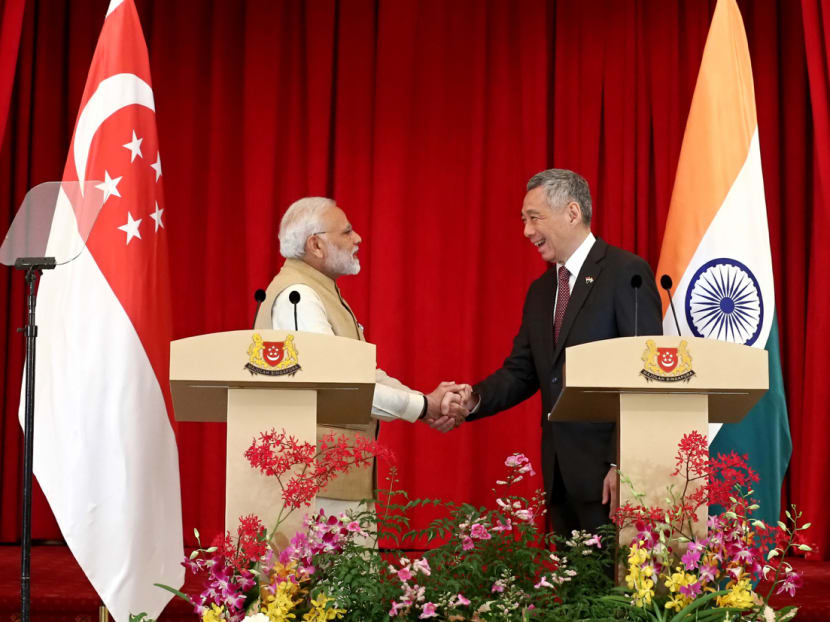PM Lee and PM Modi laud bilateral ties, pledge to deepen fintech collaborations
SINGAPORE – Lauding the strong bilateral relations between Singapore and India, Prime Minister Lee Hsien Loong on Friday (June 1) said that both countries will deepen collaboration in financial technology or fintech to advance ties between both sides.

Indian Prime Minister Narendra Modi and Prime Minister Lee Hsien Loong at the joint press conference at the Istana.
SINGAPORE – Lauding the strong bilateral relations between Singapore and India, Prime Minister Lee Hsien Loong on Friday (June 1) said that both countries will deepen collaboration in financial technology or fintech to advance ties between both sides.
Speaking at a joint press conference with India’s Prime Minister Narendra Modi at the Istana, Mr Lee noted that the economic ties of both countries “are substantive and we want to do more together”.
To that end, both countries will add fintech as one of the key pillars of the India-Singapore Strategic Partnership, which was inked in 2015. Both nations will establish a joint working group to support this new effort, said Mr Lee.
He pointed out that India “offers tremendous potential to develop fintech services” given the country’s “Digital India” vision – started by Mr Modi to bridge the digital divide in his country – and the successful implementation of the government initiative Aadhaar, which is India’s own biometric identification system.
“India is a significant market for Singapore fintech companies, while Singapore – as a global fintech hub – can be a gateway for India to enter the Southeast Asian market,” Mr Lee said.
In a sign of cooperation on the fintech front, a partnership between Singapore’s NETS and India’s RuPay digital payments systems was officially launched on Thursday (May 31).
It paves the way for NETS cards and digital wallets to be used for payments in India, and for RuPay-powered debit and credit cards to be accepted at all NETS terminals in Singapore.
Mr Modi is on a three-day official visit to Singapore, his second time here, with the first being in 2015 to mark the 50th anniversary of bilateral relations.
Pointing out that Singapore “has made untiring efforts to strengthen relations”, Mr Modi also thanked Mr Lee for his “personal friendship”.
Speaking in Hindi, he added: “Relations between India and Singapore from a strategic point of view have stood the test of time. Our relations are smooth, marked by warmth, cordiality and trust.”
While Indian companies can use Singapore as a springboard to enter its market as well as the Asean market, Mr Modi said there are also “immense opportunities and possibilities coming up in important sectors” for Singaporean companies looking to establish presence in India as it develops.
At the press conference, leaders of both countries also witnessed the signing of eight agreements, which include the conclusion of the Second Review of the India-Singapore Comprehensive Economic Cooperation Agreement (Ceca).
Under the improved Ceca, tariffs on 30 products will be reduced or removed – to the level under the Asean-India Free Trade Agreement – as well as improved rules of origin, allowing more Singapore companies to qualify for lower tariffs.
Since Ceca came into force in 2005, bilateral trade has more than doubled from S$12 billion to S$25 billion, said Mr Lee.
Singapore also became India’s second largest investor after making investments worth S$36 billion as of 2016.
Both countries will proceed with a third review of the economic pact, though no timeline has been decided. The first review of the pact concluded in October 2007, while the second review started in May 2010.
Mr Lee and Mr Modi also touched on cooperation in other areas ranging from defence to technology, smart cities and skills development.
Both sides will also review and upgrade the existing air services agreement given that air traffic growth has been strong, said Mr Lee, who pointed out that more than four million passengers travelled between the two countries last year. That figure has grown by 14 per cent in the first quarter of this year.
“An upgrade of this agreement will boost the business and tourism sectors and bring our two people closer together,” added Mr Lee.
Stressing the importance of defence cooperation, Mr Modi said that both Singapore and India will work together to combat extremism and terrorism as both countries “feel they pose the biggest threat”.
He also hailed the collaboration between the navies of both countries, which will celebrate the 25th anniversary of the annual Singapore-India Maritime Bilateral Exercise this year.
On Friday, the Republic of Singapore Navy and the Indian Navy also signed a new agreement, allowing mutual coordination and provision of logistics and services support during visits of naval ships, submarines and aircrafts to naval facilities in both countries.
Touching on regional security, Mr Modi said there is a need for freedom of navigation in Asian waters, adding that both he and Mr Lee “reiterated our principal stance, as far as maritime security is concerned, our commitment to a rules-based order”.
"We also agreed on having an open, fair and transparent maritime trade commitment in this area," Mr Modi added.
At a dialogue organised by the Nanyang Technological University later on Friday afternoon, Mr Modi spoke at length about digital disruption and its benefits, saying among others, that it “gives strength to creativity” and “bring human talent together”.
Later on Friday evening, he also delivered a keynote speech at the annual Shangri-La Dialogue, making him the first Indian leader to do so.
Prior to his stop in Singapore, Mr Modi made an official visit to Indonesia where he met President Joko Widodo, and also a short stopover in Malaysia to meet newly-minted Prime Minister Dr Mahathir Mohamad, his deputy Dr Wan Azizah Wan Ismail and political veteran Anwar Ibrahim, who is slated to take over from Dr Mahathir in a year or two.






